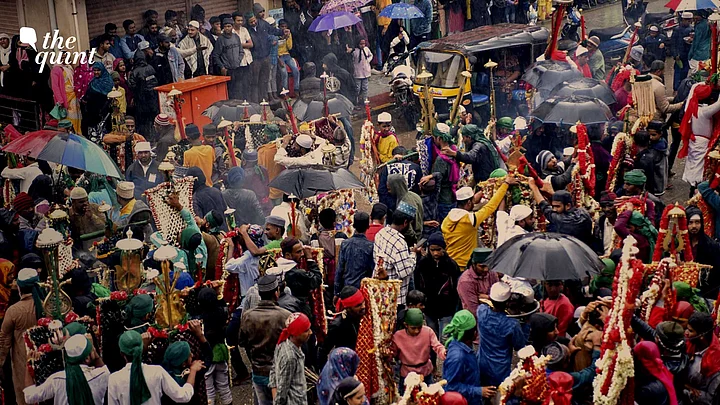Look For Things That You May Not Find
Ahead of the Union Budget announcement on 23 July, senior Congress leader P Chidambaram in his column for The Indian Express focuses on some "daunting challenges" that the Budget must address.
Talking about unemployment, he says, "For a few dozen vacancies or a few thousand posts, millions of candidates apply and write an examination or appear for an interview. Question papers leak. Bribes are paid. Some examinations or interviews are cancelled at the last minute causing great distress. These are the direct consequences of an explosive unemployment situation."
"Neglect, bordering on derision, of these issues caused the disastrous slide in the number of seats won by the BJP in the Lok Sabha elections of 2024. The BJP is not repentant. Nor, going by public statements is it willing to reconsider its model: crony capitalist, trickle-down, capital biased and protectionist."P Chidambaram, The Indian Express
UP Kanwar Yatra Order Goes Against Spirit of ‘Sabka Saath'
In the backdrop of the UP Kanwar rule, economist Swaminathan Aiyar remarks in his The Times of India column, "That Kanwariyas might unknowingly eat at a Muslim-owned shop is apparently so frightful a prospect for pilgrims that every shop must be forced to display names in order to reveal Muslim owners." He adds, "The notion that any religious group has proprietary rights over business seems absurd."
The Taj Mahal is a magnificent tomb. The Tata group has adopted its name as a brand. It produces Taj Mahal tea and runs a string of Taj Mahal hotels. Must every tea bag and hotel proclaim that the owners are Parsis? Muslims hold processions on Moharram. Should all Hindu shop-owners on a Moharram route be forced to paste their names on shops 'to avoid confusion?' Should similar rules apply to a Christian procession on Easter? BJP's slogan is 'Sabka Saath, Sabka Vikas, Sabka Vishwas.' Let this slogan also apply to all religious processions.Swaminathan Aiyar, The Times of India
Why We Say Clip-Clop, And Never Clop-Clip
In his weekly column for the Hindustan Times, journalist Karan Thapar lays down the fascinating rule of ablaut re-duplication. This, referring to how we say tick-tock and not tock-tick or ding-dong and not dong-ding. As his friend Mala explained, "it turns out it’s one of the unwritten rules of English that native speakers know without knowing."
A BBC article explains further. 'If there are three words then the order has to go I, A, O. If there are two words then the first is I and the second is either A or O.' This explains why we automatically and very comfortably say mish-mash, chit-chat, dilly-dally, shilly-shally, tip-top, hip-hop, flip-flop, tic-tac, sing-song and ping-pong. Try it the other way around and your tongue will probably get stuck to your palate: dally-dilly, song-sing, chat-chit, mash-mish. Frankly, it’s too troublesome to carry on!Karan Thapar, Hindustan Times
Leaders Must Listen
In her column for The Indian Express, writer Tavleen Singh critiques the current political dispensation for the "atmosphere of hatred and fear that has become normal since Narendra Modi became Prime Minister." Pointing to the Kanwar Yatra rule, she asks: "The Yatra has taken place for decades without trouble, so why this monstrous new edict?"
Further, she underscored the orchestrated economic boycott of Muslim businesses for the past 10 years and how UP had tried to send a message in the recently-conducted elections that they were sick of the hatred.
Why then is the Chief Minister of Uttar Pradesh allowed to continue poisoning the communal atmosphere in his state? Has he not noticed that it was his state that was most responsible for the Prime Minister being denied a full majority in his third term? It is truly as if the top leaders of the BJP have suddenly become hard of hearing or as if they are pretending to be deaf. That is worse still. Modi may have managed to become prime minister for a 'historic' third time, as he likes to tell people on his foreign travels, but he must know that things have changed for him.Tavleen Singh, The Indian Express
Whither Our Right To Work Freely Anywhere We Choose?
Yamini Aiyar, former CEO of the Centre for Policy Research argues against nativist politics in her column for the Deccan Herald. She calls the recently-announced Karnataka's government Reservation Bill — an example of "politically divisive, socially dangerous, economically shortsighted and deeply cynical approach to the deep structural challenge of jobs."
She elaborates how the proposal, which has now been put on hold, lays bare the deep fault-lines that have emerged in our economy and polity.
It is the structural failure of our economic model, where the link between GDP growth and quality jobs is broken, that has created the context in which 'reservation for locals' has found political salience. But it is a sign of the deep failure of our economic imagination that rather than investing in solving the structural challenge, our politics is displaying a deep cynicism and shortsightedness in its search for solutions. Karnataka's proposed reservation bill is only the latest in a long line of cynical responses to the economic challenge.Yamini Aiyar, Deccan Herald
Indian Shaadis Are Lavish, Why Roast Just Ambanis?
In his weekly column for the Deccan Chronicle, Pavan Varma writes about the opulent Ambani wedding which drew mixed reactions from the public. However, he writes that before leaping into hasty condemnation, Indian society must introspect: "What would we have done, if we had the Ambanis' wealth, at the weddings of our own sons and daughters? In fact, what do we still do, with far lesser resources, on such occasions at our own levels?"
Who is there then to be a role model for the middle-ground between wealth and restraint, money and gracious simplicity? Our ancient texts always emphasised that there must be the right balance between Lakshmi and Sarasvati — wealth and wisdom. In the Hindu worldview, wealth is nor reviled. In fact, artha, or the importance of material well-being is one of the four highest purusharthas or goals of life, along with dharma, kaama and moksha. But equally, these same texts stress the importance of proportion and balance, of viveka or discrimination, so that no one of these goals is followed in an uncontrolled manner. In the case of the valid pursuit of prosperity, if this balance is lost, the vulgarity of wealth will inevitably — and brazenly — overwhelm discrimination and moderation.Pavan Varma, Deccan Chronicle
Pakistan’s Multiple Tug of Wars, and the New Wave of Terror Attacks
TCA Raghavan, former High Commissioner to Pakistan, in his column for The Times of India asserts that in order to understand the string of terrorist attacks in J&K, one must widen their frame to see what is happening in Pakistan internally.
By recognising Pakistan Tehreek-e-Insaf (PTI) as a legal political party, the Supreme Court has shown how the judiciary often acts as an independent player in Pakistan politics contrary to the general perception. Hence, elaborating on Pakistan's internal political tussles, he asks, "Would a Pakistan faced with such grave challenges risk an aggravation of the situation with India which the continued terrorist attacks in J&K suggests?"
Given the situation on its western borders with Afghanistan a quiet India-Pakistan border and LoC seems to be in its interest. This, in fact, has been the logic behind the uploading of the ceasefire since 2021 notwithstanding the downturn in India-China relations. There is, however, an alternative and equally compelling reading possible. It is not a leap of faith to imagine that Pakistan's assessment of India's mood since 2019 is that it is complacent about J&K and also so with regard to Pakistan. It may well be Pakistan's view that this mood needs to checked, and a calibrated increase in security incidents provides the means to do so.TCA Raghavan, The Times of India
Wake Up, UPSC!
Writing for the Deccan Herald, author Alok Prasanna Kumar highlights the controversial and much-talked about Puja Khedkar case and how it reveals serious problems with the functioning of the Union Public Service Commission.
Further, right from covering the history of UPSC in terms of how British came to adopt it for India to how Constitutional provisions were included to ensure independent functioning of the UPSC, he elaborates the relevance of the examinations.
However, as with the judiciary, so with the bureaucracy: constitutional provisions don't matter if the individuals in office don't want to act independently. All the constitutional provisions and structures will not create independent institutions if individuals don't cultivate "constitutional morality." Perhaps, it's time for the members of the UPSC and state PSCs to think deeply about their true purpose, as summed up beautifully by Ananthasayanam Ayyanar: "A healthy, efficient and honest public service is the very backbone of a government or its administration."Alok Prasanna Kumar, Deccan Herald
The Morality of Reading, or Not Reading, Alice Munro
Professor and writer Sundar Sarukkai, in this column for the Hindustan Times writes about the dilemma of reading and teaching Alice Munro, the celebrated Canadian Nobel Prize winner in literature. This comes on the heels of the essay by her daughter Andrea Skinner about how she was sexually abused as a child by her stepfather and Munro aligned with him.
Therefore, Sarukkai asks the pertinent questions: "Should we read her books now? Should we show our solidarity with feminists and survivors of sexual abuse by censoring her work in our classes, or expunge it completely as a form of posthumous censure?"
The controversy now is more than a judgement of her personal life and is about the artistic merit of her work. Despite the successes of the characters in her stories to alert and move readers about certain issues, should she be deemed unworthy of reading and teaching because of her personal failure as a mother/woman/human?Sundar Sarukkai, Hindustan Times
More From The Quint
Exclusive: Oil Drilling in Assam National Park Can Put Biodiversity at High Risk
Examining the Claims Regarding a 'Shift' in Terrorism From Kashmir to Jammu
Kanwar Yatra: The BJP's Divisive Tactics Have Reached a New Low
Oman Mosque Attack: An Indian Expat's Tribute to the Secular & Inclusive Nation
What’s in a Name? An Identity Criterion or a Means to Discriminatory Politics?
Greater Powers for J&K LG: Modi Government's Message is Clear
Filling the Gaps in New Delhi's Connectivity Strategy Under Modi 3.0
(At The Quint, we question everything. Play an active role in shaping our journalism by becoming a member today.)

.jpg?auto=format%2Ccompress&fmt=webp&width=720)
